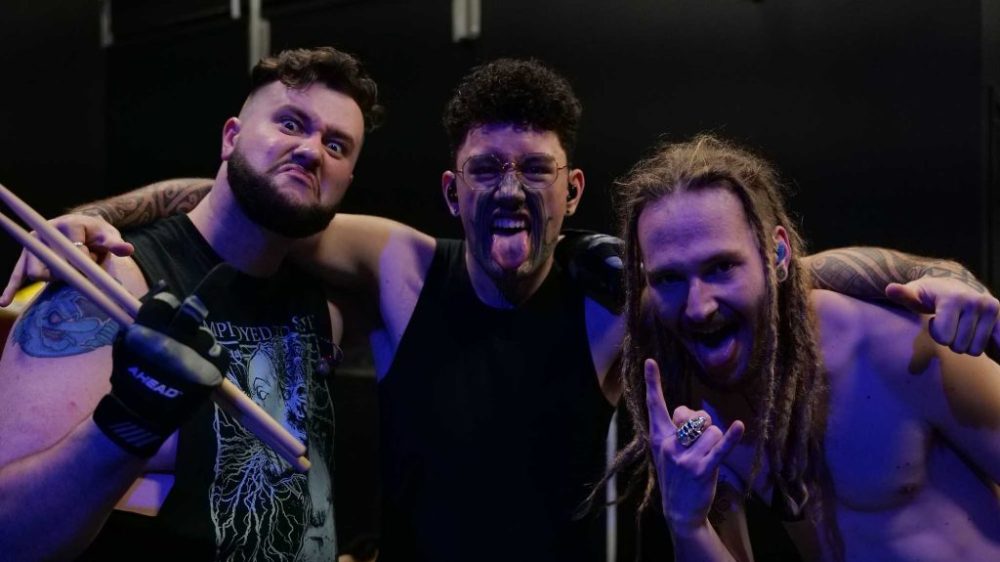Alien Weaponry and Eno: 13th Floor NZIFF Report #4
This year’s Film Festival has been a goldmine for music fans with docos and dramas on everyone from Paul Simon to Ryuichi Sakamoto.
The 13th Floor’s Marty Duda attended two more screenings this week and here is his report:
Alien Weaponry: Kua Tupu Te Ara
 Director/cinematographer Kent Belcher followed the Maori metal trio for six years starting back in 2018 and wrapping just last year.
Director/cinematographer Kent Belcher followed the Maori metal trio for six years starting back in 2018 and wrapping just last year.
Most New Zealand metalheads will know that the band got its start well before then. Brothers Henry and Lewis De Jong were just 10 and 8 years old respectively when they started raising a racket in their parents’ house. Henry took to the drums and Lewis the guitar and we see wonderful home movies of both brothers when they can barely walk, let along strut their stuff.
The writing was clearly on the wall…these kids needed to rock. Fortunately their parents, Niel and Jette, had to the good sense to encourage their musical madness. With primary school chum Ethan Trembath on bass, the band became a force to be reckoned with going from winning Smokefree Rockquest to playing at European Metal festivals like the Wacken Open Air Festival in Germany which is where director Belcher catches up with them, by which time the siblings are 18 and 16.
Niel and Jette are there as well, managing and parenting in equal measure…Niel himself was a musician and sound engineer and Jette acts as road manager and publicist.
Oh, yes, and the songs are all sung in Maori.
My experience is that metal musicians and fans are the friendliest, most inclusive musical community, and that proves to be true throughout this film.
Belcher does a good job of focusing on the brothers’ relationship with each other, their bandmates (there are eventually 3 bass players) their fans and other bands.
We get brief commentary from members of Lamb Of God and Gojira, but most this is a family affair.
There is drama…the brother scrabble as brothers do and one of them breaks a bone just before a big show in Christchurch.
The real drama could have occurred if the parents tried to “manage” the band after the boys come of age, but they are wise enough to let them grow up and out of the nest.
The film ends when Lewis turns 21. For most musicians, their creative life is just beginning, but here Henry and Lewis are seasoned veterans. Let’s see where the music takes them next.
Note: The brothers (along with Kent Belcher) attended the screening and spoke afterward and came across exactly as they did on film, a good sign for all involved and an inspiration for young musicians (and filmmakers) everywhere.
Eno
Where Alien Weaponry were heart-warming and inspiration, Eno was thought-provoking and challenging.
 Not surprising for anyone who has followed Brian Eno’s career from Roxy Music to Fripp and Bowie collaborator to U2 and Talking Heads producer.
Not surprising for anyone who has followed Brian Eno’s career from Roxy Music to Fripp and Bowie collaborator to U2 and Talking Heads producer.
And that’s just skimming the surface.
Direct Gary Hustwit addresses the challenge of documenting Eno by taking of one of Eno’s own theories to heart, that of “generative music”, defined as music that is ‘ever-different and changing, and that is created by a system’. To that end, the filmmaker had new software developed that enabled each screening of this documentary to be unique….there are supposedly millions of possible variations.
“Fascinating”, as Spock might muse.
So, the version I saw might or might not be similar to the next version that screens, which makes reviewing the film something of a head-scratcher. I can only comment on what I saw. And what I saw was pretty good.
It feels like 70% of the film is made up of current interview segments (talking heads if you will) with Eno musing on the meaning and importance of art, music and nature. He could come off as self-obsessed but doesn’t, thank goodness.
While footage of Roxy Music was scarce, we got plenty of vintage footage of Bowie, Fripp and Eno making Heroes and using those infamous “Oblique Strategies” cards. We also get a fair share of Devo and just enough Talking Heads.
I was disappointed that Eno’s foray in the No Wave scene of New York was not mentioned…I wonder if it shows up in other versions of the film.
With over 500 hours of Eno archive footage to work with, Hustwit and his crew did a great job of telling Eno’s story…actually it felt like Eno told it to us himself. And while the film didn’t present the events in chronological order, it did feel like it had a beginning, middle and an end.
After the 90 minute or so of Eno I saw, I felt like I knew more than I did before and was curious to know and explore even more. And with an almost overwhelming body of work out there…that is still growing…there’s plenty to keep me busy.
Marty Duda
Click here for Screening times and tickets
